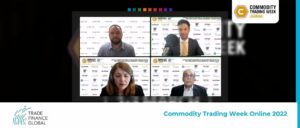Sustainability, supercycles and digitisation. These are some of the megatrends impacting commodities trading today. But against a backdrop of supply chain disruptions, high inflation, the green energy transition and most recently, the Ukraine crisis, is digitisation ready to take commodity trade finance to a new level?
In the commodities trading industry, like others, having the competitive edge is what drives a lot of the activity. It’s all about staying ahead of the curve.
As a result of the fast-changing environment, one noticeable shift has been a big change in mindset, our CPO Joshua Kroeker noted at a recent Commodity Trading Week panel titled ‘A New Era in Commodity Trade Finance’.
“We’re starting to see a shift towards more cooperation to solve a common problem. Competing doesn’t make sense. When we cooperate, we aren’t solving these problems for ourselves but for our entire industry,” said Kroeker.
Contour itself was founded through a collaboration of leading trade banks to build a new global standard for trade. It has grown its network through partnerships with trade ecosystem players, such as essDOCS, Chinsay and CargoX, to solve the industry’s pain points, whether it’s in bills of lading or trade workflows.
Digital islands – to scale or not to scale?
But this is also where it becomes a challenge. The increase in digital solutions raises the risk of being stranded on a digital island but is the only solution to build bridges between all the different digital islands?
There are barriers to more companies jumping on the digital bandwagon, like legal frameworks and universal standards, but these shouldn’t be the only considerations for corporates when thinking about digitisation.
Sanjay Tandon, Regional Head of Product and Propositions, Global Trade and Receivables Finance, Asia Pacific at HSBC, believes that where digital islands are concerned, it is important to build scale as these islands solve either a specific industry problem or a particular process problem.
In view of that, HSBC has partnered with platforms like Contour, Bolero and TradeLens, introducing solutions to solve the inefficiencies in supply chains and global trade.
“There isn’t a one-size-fits-all approach. In our view, there will be multiple platforms and multiple ecosystems which will survive, and we believe that we need to be able to work with each one of them,” Tandon said.
Three ways to think about digitisation
There are barriers to more companies jumping on the digital bandwagon, like legal frameworks and universal standards, but these shouldn’t be the only considerations for corporates when thinking about digitisation. Contour’s Kroeker discussed how corporates should be thinking about digitisation from three buckets.
Firstly, digitising all the communication within your organisation and with everyone in your ecosystem. In addition, ensuring that the communication is in a secure and fraud-resistant way.
Secondly, removing documentation and moving towards digital documents. Having a secure digital document on a digital platform is crucial. While you can digitise communication without digitising documentation, it is a lot more powerful when both come together.
Finally, digitising finance. Who is going to finance your trade? What access to finance do you have? How can I access more working capital or an alternative route to finance? While this is still far from becoming a reality, Contour is thinking about securitising and digitising these assets, as the next phase in its growth.
Communication on Contour’s decentralised network is special, as with every transaction, a new class of digital trade assets is being minted – creating a new era of digital, open and inclusive trade finance.
Sustaining the future
The panel discussion wrapped with perspectives on accelerating the green energy transition and whether it’s time to speed things up from a relationship level to a transactional level.
A leadership approach must be taken to move this to a transactional level, but Kroeker said the industry’s biggest fear is having to provide the evidence on a transactional basis and if there isn’t a way to do this efficiently, a whole lot more paperwork will be added to an already paper-reliant industry.
“I think we could really set that standard in the industry to say this is the requirement that we want to set and make sure we can tell our customers that we are maintaining, and then we can move forward with that. I think that’s a good trend, but we do need to invest in it. Otherwise, the regulation could come before the tools, which might be a bit of a disaster,” said Kroeker.
According to Tandon, the transactional approach will evolve as the meeting of sustainability goals will take decades, it won’t be a flick of a switch that will turn everything green in an instant, especially in the commodities sector.
Maryana Stober, Associate General Counsel EMEA at ADM shared her personal perspective that Environmental, Social and Governance (ESG) used to be focussed on the environment but the humanitarian crisis in Europe means that companies cannot discount the social component.
“I think this will become more and more important in the agenda of ESG, maybe shifting towards the S will become as important as the E,” said Stober, who is also President of the Women’s International Shipping and Trading Association Switzerland.
Get in touch with us to learn how you can start your digitisation journey. Click here.



